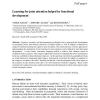Free Online Productivity Tools
i2Speak
i2Symbol
i2OCR
iTex2Img
iWeb2Print
iWeb2Shot
i2Type
iPdf2Split
iPdf2Merge
i2Bopomofo
i2Arabic
i2Style
i2Image
i2PDF
iLatex2Rtf
Sci2ools
110
click to vote
AR
2006
2006
Learning for joint attention helped by functional development
Cognitive scientists and developmental psychologists have suggested that development in perceptual, motor and memory functions of human infants as well as adaptive evaluation by caregivers facilitate learning for cognitive tasks by infants. This article presents a robotic approach to understanding the mechanism of how learning for joint attention can be helped by such functional development. A robot learns visuomotor mapping needed to achieve joint attention based on evaluations from a caregiver. The caregiver adjusts the criterion for evaluating the robot's performance from easy to difficult as the performance improves. At the same time, the robot also gradually develops its visual function by sharpening input images. Experiments reveal that the adaptive evaluation by the caregiver accelerates the robot's learning and that the visual development in the robot improves the accuracy of joint attention tasks due to its well-structured visuomotor mapping. These results constructi...
Related Content
| Added | 10 Dec 2010 |
| Updated | 10 Dec 2010 |
| Type | Journal |
| Year | 2006 |
| Where | AR |
| Authors | Yukie Nagai, Minoru Asada, Koh Hosoda |
Comments (0)

